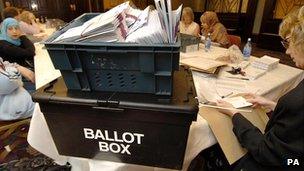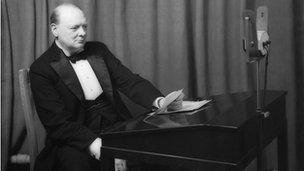Local council elections herald political 'mid-term'
- Published
- comments

Two years on from the general election, this year's council polls herald the political 'mid term'
Any political commentator given a word association exercise would have no hesitation in saying what goes with 'mid-term' - and that is clearly the word 'blues'.
Halfway though most parliaments comes the point where the main opposition party traditionally gains ground.
The government of the day has started to lose any early lustre; a measure of disillusionment often sets in, leaving only the slow, steady grind of policy implementation.
Eventually, the parties hope that enough of a 'feel good factor' will be be stoked-up in the latter stages of the Parliament for them to be re-elected.
Exactly two years on from the last general election, this year's council polls are shaping up to be a classic example of mid-term politics.
'Mid-term blues'
What with the so-called 'Tory Spring', ('granny tax', 'pasty gate' and now the row over taxing charitable donations), the Conservatives, external are having their worst run of form since David Cameron came into office.
And with the Liberal Democrats, external ratings as low as 12% in some polls, many observers suggest the coalition' s junior partners may be about to feel UKIP, external breathing down their necks.
The Midlands is famously volatile territory electorally, so what are the prospects in the 18 councils holding elections on Thursday, 3 May?
1. Birmingham
One of the biggest local authorities in Europe with an annual budget of £4 billion, England's 'second city' has been ruled since 2004 by a Conservative-Liberal Democrat coalition widely portrayed as a trailblazer for the one at Westminster.

The West Midlands is famously volatile territory during election periods
But Labour, external is already the largest single party and with one-third of the 120 seats up for election, they need only four net gains to regain overall control.
2. Cannock Chase
Labour is currently the largest single party in a minority administration, but with one-third of the seats up for election they need only four net gains for overall control.
3. Cheltenham
The Midlands' only Liberal Democrat-controlled local authority: they have a majority of 10 over the 12 Conservatives and three People Against Bureaucracy, external.
With half of the council's seats up for election, if it turns out to be a bad night for the Lib Dems it would not be impossible for the Conservatives to take control.
4. Coventry
With one-third of the seats up for election, Labour is hoping to improve on its current overall majority of 16.
5. Dudley
The Conservatives have controlled the town on the hill for eight years but Labour need nine net gains for an overall majority.
Here again, one-third of the seats are being contested.
6. Gloucester
The Conservatives face a stern test defending their slender overall majority of just two seats.
One- third of the seats are up for grabs.
7. Newcastle-under-Lyme
Currently, like Birmingham, it's run by a Conservative-Liberal Democrat coalition.
But just as in the 'big city', Labour are eyeing an overall majority. They need six more seats here.
One-third of the seats are up for election.
8. Nuneaton and Bedworth
Labour currently has a minority administration here but with half the council seats up for election, they need just one net gain to control it outright.
9. Redditch
The Conservatives have had an overall majority since 2008 but they would lose outright control if they suffer four or more net losses.
Labour needs 10 more seats for an overall majority. One-third of the seats are being contested.
10. Rugby
The Conservatives have had an overall majority since 2007.
But now with the entire council up for election on new boundaries they have a fight on their hands to win the 22 seats they require to retain overall control.
11. Sandwell
A Labour stronghold, they will be defending an overall majority of 48.
One-third of the seats are being contested.
12. Solihull
The Conservatives regained control of their former stronghold last year.
They will need to win seven of the 17 seats up for election to retain control. That again represents one-third of the seats.
13. Stratford-on-Avon
With one-third of the council up for election, the Conservatives defend an overall majority of 15.
14. Tamworth
A similar picture here, with one-third of the seats up for election and the Conservatives defending a majority of 13.
15. Walsall
On a knife-edge, the Conservatives and Labour both currently have 27 seats but the Conservatives have a minority administration.
With one-third of the seats up for election, Labour need four net gains to take overall control.
16. Wolverhampton
With one-third of the city's seats up for election, Labour will be hoping to strengthen its overall majority of 10.

Worcester's Conservative group defend an overall majority of just one
17. Worcester
Electorally forever renowned for the apocryphal 'Worcester Woman' of middle England fame, it's a city whose controlling Conservative group defends an overall majority of just one.
With one-third of the seats up for election here, as in Gloucester, they face a tough battle if they are to avoid becoming a minority administration.
18. Wyre Forest
Famously the cradle of 'people power' when the furore over the downgrading of Kidderminster Hospital swept Independent Health Concern into power a decade ago.
But they currently have just five seats.
The Conservatives defend an overall majority of two and with one-third of the seats up for election, they need to retain six of them to maintain their overall majority.
'End of the beginning'
By now you will have gathered that control of some important local authorities is at stake here: it's much more than just a progress report on the so-called 'new politics' at Westminster.
But whenever has that stopped us?
Westminster-watchers everywhere will be distilling the significance of the voters' verdicts as the halfway mark in this first fixed-term Parliament comes into view.

Westminster-watchers could learn from Churchill's words of wisdom
As Winston Churchill memorably put it after the Battle of Britain in 1940: "This is not the end. Nor is it the beginning of the end. But it is the end of the beginning."
It may not quite be war this time, but these halfway house elections do offer an intriguing setting for our conversations on our Sunday Politics programme.
During the election period, I will be talking to each of the major parties in turn: it will all balance up in the end, I promise!
Last week I spoke to the Liberal Democrats and UKIP.
This Sunday I will be joined by:
Margot James, external, the Conservative MP for Stourbridge;
Tom Harris, external of the Green Party, which launched its local election manifesto in Solihull this week.
And I hope you will be able to join me too, at the later time of 14.00 on BBC One on Sunday, 22 April 2012.
Keep up with me on Twitter: PatrickBurnsBBC, external